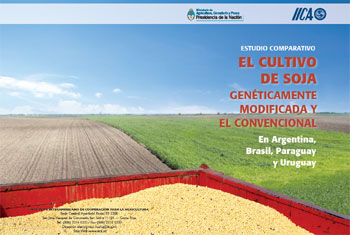Technology package applied to the growing of soybeans generates environmental and economic benefits for the Southern Cone

Punta del Este, Uruguay, October 30, 2012 (IICA). The application of technologies such as direct seeding as well as chemical and biological nutrition, correct use of biocides (herbicides, insecticides and fungicides) and use of genetically modified seeds (GM), combined with a clear framework for biosafety and the decision by producers to take advantage of innovative techniques, have enabled the countries of the Southern Cone to reduce the environmental impact of soybean cultivation and to transform it into the main agricultural export.
This is one of the main conclusions of the comparative Study on the cultivation of genetically modified and conventional soybeans in Argentina, Brazil, Paraguay and Uruguay that has just been published by the Ministry of Agriculture, Livestock and Fisheries of Argentine (MAGP) and the Inter-American Institute for Cooperation on Agriculture (IICA).
The report was handed over to the Ministers of Agriculture of these countries, during the meeting of the Southern Agricultural Council (CAS) held in Punta del Este, Uruguay. The nations included in the study account for almost 50% of the world’s soybean production.
The meeting of the CAS is taking place simultaneously with the Second World Conference on Agricultural Research for Development (GCARD2), at which a delegation of IICA specialists in innovation are participating, headed by its Director General, Víctor M. Villalobos.
According to the study, direct sowing, chemical and biological nutrition, biocides and the use of varieties of transgenic soybeans make up the technology package that is having a positive environmental impact, when compared to conventional soybean cultivation.
“In order to obtain current yields, the growing of conventional soybeans requires a larger surface area and ground labor than the growing of GM soybeans. Furthermore, it is more polluting to the water, air, and soil owing to the use of various agricultural chemicals, and contributes more to greenhouse gas emissions”, the study concludes.
In 2011, in Argentina, Brazil, Paraguay, and Uruguay more than 40 million hectares of this legume was planted, while in 1976, when it was planted for the first time, it was 1.37 million hectares.
“The introduction of GM soybean seeds has revolutionized the crop in the four countries, because of the ease of agronomical management, weed control, and the reduction of production costs”, the report explains, adding that the economic difference between the direct costs of cultivation of transgenic and conventional seeds is 15% in favor of the technology package described.
Some advantages of this package, pointed out in the MAGP/IICA publication, are that direct seeding minimizes soil erosion, while plant nutrition (based on chemical fertilization) facilitates the rehabilitation of degraded areas. Furthermore, the use of nitrogen-fixing bacteria helps to diminish the amount of fertilization with this material which is responsible for the emission of nitrous oxide, the principal greenhouse gas.
The technical coordination of the study was the responsibility of the Director-General of IICA and the Coordinator of biotechnology and biosafety of the Institute, Pedro Rocha.
According to Villalobos and Rocha: “The regulatory frameworks for biosafety in the countries that were the object of this study provided the conditions for carrying out the corresponding studies on the potential risks of this technology for human and animal health, as well as for the environment.”
A challenge indicated by the research it is that of maintaining the benefits of the technology package applied to soybeans in the countries of the Southern Cone, through optimized agricultural practices and new technologies aimed at guaranteeing food security within a context of population increase, the need for environmental conservation and climate change.
For more information, contact:
pedro.rocha@iica.int